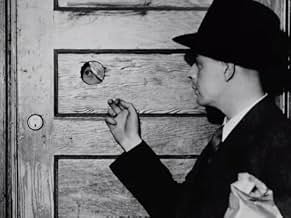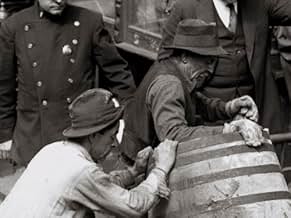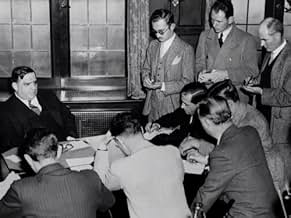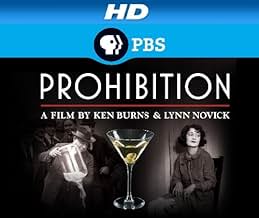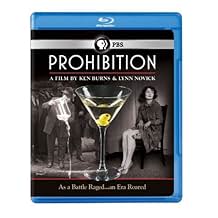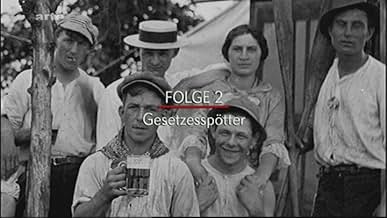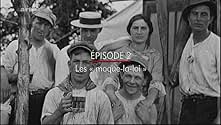IMDb RATING
8.2/10
3.6K
YOUR RATING
The story of the American activist struggle against the influence of alcohol, climaxing in the failed early 20th century nationwide era when it was banned.The story of the American activist struggle against the influence of alcohol, climaxing in the failed early 20th century nationwide era when it was banned.The story of the American activist struggle against the influence of alcohol, climaxing in the failed early 20th century nationwide era when it was banned.
- Won 1 Primetime Emmy
- 1 win & 3 nominations total
Browse episodes
Featured reviews
This huge three-part series covers a lot of ground on not only the failed prohibition laws in the US but also of America's turbulent love affair with alcohol.
This is an excellent six-hour presentation. I knew a lot about the time. Or at least I thought so until this presentation. The details and pictures bring time and problems to life. Now we can see the problems of this day as a reflection of prohibition and its side effects.
A lot of information well presented gives you the fee that you lived through that time.
We have a strange collection of readers that you would never have guessed they would be: Patricia Clarkson John Lithgow Campbell Scott Sam Waterston
Includes the following episodes: "A Nation of Drunkards." "A Nation of Scofflaws." "A Nation of Hypocrites."
Narrator Peter Coyote Based on a book by Geoffrey C. Ward A PBS production.
A lot of information well presented gives you the fee that you lived through that time.
We have a strange collection of readers that you would never have guessed they would be: Patricia Clarkson John Lithgow Campbell Scott Sam Waterston
Includes the following episodes: "A Nation of Drunkards." "A Nation of Scofflaws." "A Nation of Hypocrites."
Narrator Peter Coyote Based on a book by Geoffrey C. Ward A PBS production.
This is the latest documentary series from Ken Burns--the docu-god for Public Broadcasting. Not surprisingly, with his amazing reputation for perfection, he was able to once again get many of America's top actors to provide their voice talents to the shows--such as Tom Hanks, Sam Waterston and Blythe Danner. And, like so many PBS documentaries, Peter Coyote narrates more than capably.
The miniseries consists of three episodes. The first is about the background leading to Prohibition--the temperance movement and problems with alcohol over-consumption. It also ends with the implementation of the Constitutional Amendment. Part Two is about the practical aspects of the law. The difficulty in enforcement is due to a lack of widespread support, loopholes in the law as well as the way the law actually ENCOURAGED the growth of organized crime. Part Three is about the rising dislike of the law that led to its repeal.
Overall, it's yet another very good series by Ken Burn and is among the best shows you can find on the topic. Well worth your time--and it manages to make an educational show fun...of sorts.
The miniseries consists of three episodes. The first is about the background leading to Prohibition--the temperance movement and problems with alcohol over-consumption. It also ends with the implementation of the Constitutional Amendment. Part Two is about the practical aspects of the law. The difficulty in enforcement is due to a lack of widespread support, loopholes in the law as well as the way the law actually ENCOURAGED the growth of organized crime. Part Three is about the rising dislike of the law that led to its repeal.
Overall, it's yet another very good series by Ken Burn and is among the best shows you can find on the topic. Well worth your time--and it manages to make an educational show fun...of sorts.
Prohibition took place in the early 1900's, was unpopular, and was repealed. That was the extent of my knowledge on prohibition. Ken Burns proved that such a big part of our country's history is worth taking a closer look at.
The storytelling is excellent, with interviews of and narration by folks you'll likely recognize. The archival footage is eye-opening and heartbreaking. The comic relief is perfectly timed, and the facts presented here linger on the mind long after the TV is off.
Personal preference will dictate whether the film's length outlasts its charm. I usually like things short and sweet, but I couldn't hold myself to a single episode in one sitting. However, at 5 hours it'll probably wear down the patience of some viewers.
The only other downside I can think of is that some points are overly expounded upon, while other enticing tidbits will be mentioned briefly but not fully exemplified. I almost doubled the length of one episode by continuously pausing and googling something for more clarification.
Of course, that could've been Ken's plan all along.
The storytelling is excellent, with interviews of and narration by folks you'll likely recognize. The archival footage is eye-opening and heartbreaking. The comic relief is perfectly timed, and the facts presented here linger on the mind long after the TV is off.
Personal preference will dictate whether the film's length outlasts its charm. I usually like things short and sweet, but I couldn't hold myself to a single episode in one sitting. However, at 5 hours it'll probably wear down the patience of some viewers.
The only other downside I can think of is that some points are overly expounded upon, while other enticing tidbits will be mentioned briefly but not fully exemplified. I almost doubled the length of one episode by continuously pausing and googling something for more clarification.
Of course, that could've been Ken's plan all along.
It might be a bold statement, but I personally feel that Prohibition was arguably the biggest mistake America ever made, with the possible exception of the Vietnam War. Ken Burns, already well known for making a great deal of extremely high quality films and documentaries about a variety of subjects (including the aforementioned one), has once again delivered a riveting and deeply interesting experience that no history aficionado should miss. Although this series is shorter than many of his others, it's no less intriguing as it delves into how the movement to get alcohol banned in the United States actually started almost a century before the amendment banning it was passed. We learn how it was endorsed by a lot of different groups of people (many of them women), and they all had different reasons for wanting to see it go. Many priests had heard countless stories of women being abused by their husbands, ordinarily mellow people being turned into brutes, and children being neglected all because of drinking. Many had seen how beer and wine could ruin not just one person, but whole communities. The film does a great job of showing every conceivable angle to the story of prohibition, and discusses in detail how people, many of them Irish and German immigrants who loved to drink, tried their hardest to make sure it wouldn't go anywhere. Many bar and saloon owners were convinced such a ridiculous act would never happen, as the federal government was too reliant on taxes paid by these establishments. Meanwhile, once prohibition actually came into effect, people who were law abiding citizens before the act became criminals just to get what they viewed as theirs in the first place, and those who were already criminals became even more wealthy, as many new opportunities were opened. Of course, you can't talk about this era and not bring up the mobster aspect of it. Thugs like Al Capone (who was sometimes seen as someone much more respectable than just a thug) ran huge, elaborate bootlegging operations that encompassed entire cities, had their minions kill or threaten anyone who stood in their way, and left a legacy on america that's still talked about now. Burns also masterfully explains how the horrendous flu pandemic of 1918 and the First World War, both of which left millions dead, contributed to a much more flippant and hedonistic way of living which resulted in flappers. Women came to realize that life was short and you can die at any moment, so they dove into a sexualized lifestyle that made their Victorian parents quite angry. Despite the fact that prohibition was tearing the country apart, people were still breaking the law left and right and drinking whenever they wanted to. Thousands of speakeasies were operated all across america. These carefree times would eventually come to a tragic and sudden end in 1929, when a stock market crash caused the most dire emergency america had faced since the Civil War. This is just a small selection of the things talked about in this documentary. If you're like me and you've already seen Burns' masterpiece on the vietnam war (probably the best thing he ever did), you'll feel right at home. The same narrator is here, and there's more than enough archive footage. All I can say is if you like to drink, and especially if you don't like to, then this is for you.
Did you know
- TriviaAlthough the documentary gives the etymology of the term 'bootlegging' (people selling illegal liquor from flasks that they kept in their boot legs), the origin of the term 'speakeasy' is not further explained. According to the Etymology Dictionary, these illegal liquor saloons were called 'speakeasies' "because of the practice of speaking quietly about such a place in public, or when inside it, so as not to alert the police or neighbors".
- ConnectionsFeatured in CBS 11 News: Episode dated 17 August 2011 (2011)
- How many seasons does Prohibition have?Powered by Alexa
Details
- Runtime
- 1h(60 min)
- Color
- Sound mix
- Aspect ratio
- 16:9 HD
Contribute to this page
Suggest an edit or add missing content

